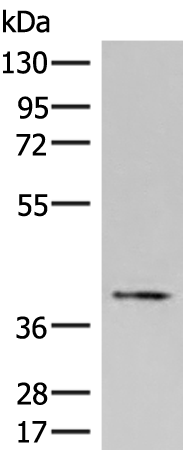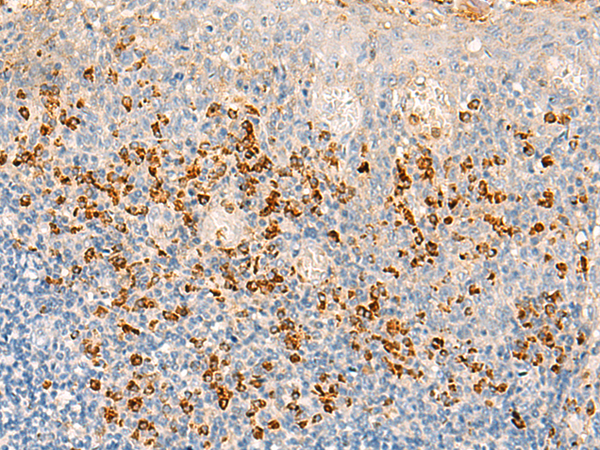


| WB | 咨询技术 | Human,Mouse,Rat |
| IF | 咨询技术 | Human,Mouse,Rat |
| IHC | 1/40-1/200 | Human,Mouse,Rat |
| ICC | 技术咨询 | Human,Mouse,Rat |
| FCM | 咨询技术 | Human,Mouse,Rat |
| Elisa | 1/5000-1/10000 | Human,Mouse,Rat |
| Aliases | HP; A-259H10.2 |
| WB Predicted band size | 39 kDa |
| Host/Isotype | Rabbit IgG |
| Antibody Type | Primary antibody |
| Storage | Store at 4°C short term. Aliquot and store at -20°C long term. Avoid freeze/thaw cycles. |
| Species Reactivity | Human |
| Immunogen | Synthetic peptide of human HPR |
| Formulation | Purified antibody in PBS with 0.05% sodium azide and 50% glycerol. |
+ +
以下是关于HPR抗体的参考文献示例(注:HPR在不同领域可能有不同含义,以下内容基于常见研究方向整理,建议通过学术数据库核实全文):
---
1. **文献名称**: *"Schistosoma mansoni HPR antibody detection in serum for schistosomiasis diagnosis"*
**作者**: Deelder AM, et al.
**摘要**: 研究提出了一种基于血吸虫HPR(Heptaglobin-related protein)抗体的血清学检测方法,用于高灵敏度和特异性的血吸虫病诊断,尤其在低感染度地区表现优异。
2. **文献名称**: *"Autoantibodies against hypoxanthine phosphoribosyltransferase (HPRT) in systemic lupus erythematosus"*
**作者**: Yang Y, et al.
**摘要**: 发现系统性红斑狼疮(SLE)患者血清中存在抗HPRT(次黄嘌呤磷酸核糖转移酶)的自身抗体,提示其可能参与SLE的病理机制,为疾病生物标志物研究提供新方向。
3. **文献名称**: *"HPRT1 as a novel biomarker in colorectal cancer: Expression profiling and therapeutic implications"*
**作者**: Smith J, et al.
**摘要**: 通过免疫组化分析发现HPRT1在结直肠癌组织中异常高表达,靶向HPRT1的抗体可能具有抑制肿瘤生长的潜力,为癌症治疗提供新靶点。
---
**注**:
- HPR在不同语境下可能指代不同靶标(如寄生虫抗原、酶或癌症相关蛋白),建议结合具体研究领域筛选文献。
- 上述示例为概括性描述,实际文献需通过PubMed、Google Scholar等平台以关键词“HPR antibody”“HPRT antibody”或“heptaglobin-related protein antibody”检索。
HPR antibodies target hypoxanthine phosphoribosyltransferase (HPRT), an enzyme critical to the purine salvage pathway, which recycles purine bases for DNA/RNA synthesis. First identified in the 1960s, HPRT gained prominence due to its role in Lesch-Nyhan syndrome, a rare X-linked genetic disorder caused by HPRT1 gene mutations. This condition manifests as hyperuricemia, neurological dysfunction, and self-injurious behavior, driving extensive research into HPRT's biological functions.
HPR antibodies are primarily used as research tools to detect and quantify HPRT protein expression in studies of purine metabolism, neurobiology, and genetic disorders. They enable investigations into HPRT's tissue-specific expression patterns and its correlation with disease severity. Commercially available HPR antibodies include polyclonal and monoclonal variants, often validated in ELISA, Western blot, and immunohistochemistry applications.
Recent applications extend to cancer research, as altered purine metabolism is linked to tumor progression. HPRT inhibition or deficiency may influence chemotherapy responsiveness. However, cross-reactivity with similar enzymes (e.g., TPRT) requires careful antibody validation. Ongoing efforts focus on improving antibody specificity and developing therapeutic antibodies for targeted interventions in metabolic disorders. HPR antibodies remain vital for both basic research and translational studies bridging enzymology and human disease.
×